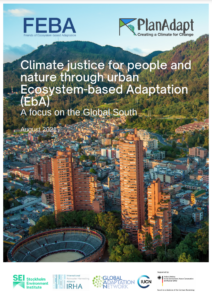Climate Justice for People and Nature through Urban Ecosystem-based Adaptation (EbA) – A focus on the Global South
 The Urban EbA Working Group of the Friends of EbA (FEBA), coordinated by PlanAdapt and the International Union for Conservation of Nature (IUCN), recently published a technical paper ‘Climate Justice for People and Nature through Urban Ecosystem-based Adaptation: A focus on the Global South’. The team of authors encompassed PlanAdapt’s Mariana Vidal Merino (as lead author), Yi hyun Kang, Sumetee Pahwa Gajjar and Jesse DeMaria-Kinney.
The Urban EbA Working Group of the Friends of EbA (FEBA), coordinated by PlanAdapt and the International Union for Conservation of Nature (IUCN), recently published a technical paper ‘Climate Justice for People and Nature through Urban Ecosystem-based Adaptation: A focus on the Global South’. The team of authors encompassed PlanAdapt’s Mariana Vidal Merino (as lead author), Yi hyun Kang, Sumetee Pahwa Gajjar and Jesse DeMaria-Kinney.
Local ecosystems and biodiversity can greatly improve the liveability of our increasingly urbanised world. Ecosystem-based Adaptation (EbA) is a nature-based approach which can help societies and ecosystems adapt to the impacts of climate change. Ecosystems and their services can additionally deliver climate just outcomes, particularly in urban areas of the Global South. This joint technical paper, developed by the Friends of Ecosystem-based Adaptation (FEBA) Urban EbA Working Group, gathers practical examples of urban EbA interventions and explores their links to climate justice through seven proposed EbA Social Principles.
The paper establishes seven EbA Social Principles – based on existing principles and criteria for EbA, ecosystem-based disaster risk reduction (Eco-DRR) and nature-based solutions (NbS) – which include Participation and inclusiveness, Capacity building, Fairness and equitability, Integration of traditional/local knowledge, Livelihood improvement, Gender consideration and Appropriateness of scale. The paper discusses the alignment of these principles with distributive, procedural and recognitional forms of justice. It envisions that their deliberate consideration at various project stages can help guide the just implementation of EbA initiatives, particularly in urban contexts, and contribute to achieving climate just outcomes for people and nature.
The publication showcases practical examples of urban EbA interventions that were gathered via an online survey and explores their links with aspects of climate justice through the EbA Social Principles. The technical paper identifies the characteristics, components, planned purposes and enabling environments of various urban EbA measures within the 31 reported case studies to assess their suitability and effectiveness in different settings. Most of the surveyed urban EbA interventions reported a range of adaptation strategies encompassing social, physical and institutional components. Regarding the EbA Social Principles, the majority of the projects reported a high level of Gender consideration and Fairness & equitability while incorporation of Livelihood improvement and Capacity building were less common. Six selected case studies from the survey were explored through in-depth narratives to further illustrate lessons learned and their links to the EbA Social Principles. The survey examples and in-depth case study narratives explore EbA interventions’ potential to deliver climate-just outcomes for urban areas in the Global South.
The technical paper is available to download here and the case study StoryMaps are viewable here. Please find the video of the publication launch here.

Ecosystem-based Adaptation is the major social issue but non-government organizations take action on it, and every person should take responsibility for individuals.
Thanks for sharing this information, wonderful post, very useful blog